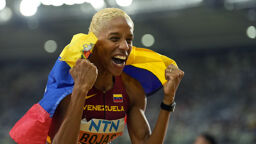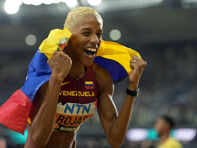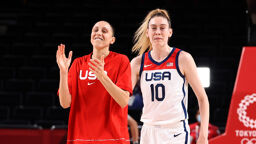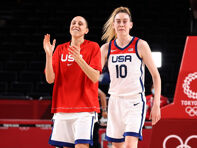By Peter Cassels
Bay Windows Staff
Corey Johnson urges Outsports readers to e-mail him.
The co-captain of a Massachusetts high school football team may be the first high school athlete in the nation to declare his homosexuality so publicly while still enjoying the support of his teammates, parents and coaches. Corey Johnson, a senior linebacker and guard on the Massconomet Regional High School squad, came out in April 1999, but delayed discussing it with the news media until now.
On March 25, the Boston Gay, Lesbian and Straight Education Network bestowed its Visionary Award on Johnson and his teammates at its annual conference at Tufts University.
 |
| Corey Johnson, with his parents Ann and Rod Richardson, at the Gay, Lesbian and Straight Education Network’s regional conference March 25, where Corey received an award for his courage in coming out to his varsity football team. PHOTO: Marilyn Humphries |
Even though he was pursued by national media to tell his story, Johnson told Bay Windows during a March 26 interview that he wanted to wait until this year's football season was over, fearing it would draw attention away from the task at hand: winning games.
His story is unusual in that he didn't experience much of the hostility some youths do when they come out. Although they were surprised, teammates, classmates and the community north of Boston where he lives didn't harass Johnson. For the most part, even competing team members accepted his homosexuality.
The shock that a high school sports star could be gay may be attributed to the fact that no one suspected. The athlete, who turns 18 in April, stands five feet nine inches and weighs 175 pounds, defies the mainstream stereotype of a gay man. “I’ve never been to a Broadway musical in my life,” he kids.
However, the universal acceptance belies months of worry, depression and stress that preceded his decision.
Johnson, who says he’s known since he was 12 or 13 that he’s gay, is the model of the All-American teenager. Growing up in upper-middle-class, conservative Middleton on Cape Ann, he’s been involved in sports his entire life. Besides football, he’s played baseball, basketball and lacrosse and was a member of the school’s wrestling team.
“When I first started having sexual feelings, it was like a non-issue,” he recalls. “I said, ‘Okay. Whatever.’ There are others things to do.”
While he had heard some negative comments about gays, there was one incident that brought it home: A family friend said something derogatory during a Super Bowl party in his sophomore year.
“I got up, went into the bathroom, sat down and cried. It was the first time it hit me. The following week it was permeating me. I was feeling it deeply. I became depressed and somewhat volatile in my emotions.”
Johnson decided to see his guidance counselor and came out to her, saying he was bisexual. “She was very supportive.” Two weeks later he came out to a teacher.
That spring he missed a day of school because of his depression, so he had to sit out lacrosse practice that day. His coach, who was also his history teacher, asked Johnson what was wrong. “It was a rainy, dreary, morose day. I came out to him in the middle of the lacrosse field. He said ‘Don’t let anyone tell you there’s something wrong with you. You’re a special person.’ We talked about it for about an hour and a half.”
While still depressed that summer, “things were better because I didn’t have to deal with school. That was a major stress reliever.”
Johnson and his team had a great 1998 season, finishing with a ten-and-one record. In early December, after the season ended, he was elected co-captain. “My parents were unbelievably happy and proud of me.” By Christmas vacation he had come out as gay to two more faculty members, but still faced a major challenge: telling his parents.
On Jan. 4, 1999, he told his mother he wanted to talk. They went for a drive. Once on the highway, his mom demanded to know what was wrong. He suggested they stop first, but she refused.
“I said, ‘Mom, every morning before you drop me off at school, you tell me you love me and every night before I go to bed, you tell me you love me.’ I said, ‘I have something very important to tell you and all I want to do is strengthen our relationship. ‘ She told me I could tell her anything. By now, I was crying. I said, ‘Mom, I’m gay.’ She said, ‘Oh, that doesn’t matter. I love you unconditionally. You’re my son. So we sat in a parking lot and talked and cried for about half an hour.”
He came out to his father a few days later, but he already suspected because he read an on-line computer conversation Johnson had a year earlier. “He was extremely supportive. He said, ‘I’m glad you finally made the decision to tell us and I hope you’ll feel a lot better now.'” Later, he told his 10-year-old sister, who was “fine with it.”
Johnson felt like “I lifted a large anvil off my shoulders,” but decided a few months later that he wanted to come out to his football team. “I felt like I owed it to myself and to other people
that I shouldn’t be ashamed of that part of myself.”
He made the decision on March 25, 1999, at the annual GLSEN Boston conference. He had come out to an adviser to his school’s gay/straight alliance, but had never attended a meeting. The adviser asked him if he wanted to attend the conference. “The other attendees didn’t know I’m gay. I was timid and scared getting on the bus with them.” Today he is the group’s co-chair.
Within a few weeks, Johnson met with the faculty members who knew. The majority advised him to wait until he graduated so he wouldn’t have to suffer potential harassment. “I told them from my heart how I felt and how important this was to me and my well-being. They totally supported me.”
He wanted to tell one more person before he told the team: his best friend Sean, a constant companion on the athletic field for a year and a half. They played football and lacrosse and served on the wrestling team together. On April 7, he pulled Sean out of class. They sat on a bench outside. “I said, ‘Sean I’m gay.’ He said, ‘No, you’re not. Stop kidding around.’ I said, ‘No, Sean. I’m really gay. I’m not kidding.’ He leaned back, took it all in and started crying. I said, ‘Sean, what’s the matter?’ He said, ‘Well, I thought I knew everything about you. And I’m sorry you couldn’t tell me this part you’ve been hiding.'” Sean remains his best friend.
Then he told his football coach, Jim Pugh, who also teaches special education, and told him he wanted to tell his teammates. Pugh, too, was supportive and agreed.
With the cooperation of the administration, Pugh arranged to get his junior classmates on the team together the next day, April 8. With the season long over, they were puzzled about why a
meeting was being held.
Johnson didn’t pull any punches: “I stood up in front of the team and said, ‘Guys, I called this meeting because I have something I really want to tell all of you. And I hope you’ll be supportive. … The reason I’m telling you all is because I don’t want you hearing it from somebody else. I’m coming out as an openly gay man.’ Their jaws dropped, their eyes bulged. I said, ‘I’m still the same person I’ve always have been. …I hope this won’t change anything.'”
He suspected illogical fears by now were racing through their heads, so he told them: “I didn’t come on to you in the locker room last year. I’m not going to do it this year. Who says you guys are good enough anyway?”
That broke the tension. As the meeting drew to a close, some teammates said what was on their minds. One said, “I’m glad you told us. I’d like to be supportive of you in any way possible.” Another said, “Even if others on the team don’t agree with you being gay, in order to be cohesive team, they just have accept it and put it aside.”
Within two minutes after the meeting, the entire school knew. To a person, they told Johnson they were surprised and didn’t have a clue. Support was far more common than criticism, although, he says, there were a few homophobes. “One of the GSA advisers – Johnson declined to say which one – was inspired to come out three days before he told the team. Johnson said she asked herself, “If this 16-year-old can come out why can’t I?”
Not that he didn’t encounter some opposition. While his teammates weren’t upset, a few of their parents were. One suggested re-voting for captain. Pugh told him that it was a non-issue and wouldn’t consider it. The coach added that what he was doing in raising these questions was a lot more destructive for the team than Johnson’s being gay.
His teammates took his sexuality in stride. In the locker room, they asked about what kind of guys he likes and where’s the nearest gay bar was. “I said there’s a gay bar in Boston called the Ramrod. They said, ‘Oh, we want to get T-shirts from there.’ They joked around about it in a very inclusive way.”
Johnson tells two stories. The second game of the 1999 season was against rival Winfield High School. During the week leading up to the game, its captain was using anti-gay rhetoric and epithets. “The coach told his players he could not play. I found that out the day of the game.”
When Johnson walked on the field, the Winfield player across from him said, “Faggot, we’re going to kill you, you fucking homo.” “I just started laughing because I had come out to my football team and my parents and this one kid thinks he’s going to intimidate me. I went back to the huddle and I told the team what just happened. The other co-captain, said, ‘Don’t worry Corey, we have your back.’ We won 25-to-0.”
Later in the season they defeated Weston High School. On the bus ride home the team sang. “Somebody said let’s sing a song for Corey. They started singing the Village People’s ‘YMCA’ and, later, ‘It’s raining men.’ Then they started chanting ‘GSA!’ I got up and bowed and everyone started laughing.”
Pugh has nothing but praise for Johnson, whom he described as one of his toughest players: “You have to stand up and be who you are. That’s what Corey wanted to do. Football coaches I’ve talked to throughout the league and all over have said the kid has to have a lot of guts to go into that arena and tell them. It’s unusual.
“This kid has moved a lot of people, including adults. He’s done a lot for the football program and the school and you’ll continue hearing a lot of good things about Corey.”
Asked what advice he would give other gay athletes, Pugh says: “I think it’s a kid’s individual choice. Not all kids would be as comfortable dealing with the stupid remarks of some ignorant people. You have to be pretty strong. Here he is coming out knowing that he could take quite a bit of abuse from a lot of people, so it’s perhaps not the best thing for every kid. But as you break down these barriers, we have to deal with it and accept it.”
Pugh credited the school, parents, the community and, particularly Jeff Perrotti and Deb Levy of the Massachusetts Safe Schools program. “They were with us all the way. Jeff came to many, many meetings at the school.”
Dan Woog, author of “Jocks: True Stories of America’s Gay Male Athletes,” told Bay Windows he agrees with Pugh’s assessment: “Corey is my hero. He has done something that, to my knowledge, has never been done before. And he has done it with dignity, poise, intelligence, passion – even a bit of humor. He is the epitome of what a high school student-athlete should be. Corey has opened the eyes and hearts of minds of so many people.
“From now on, I hope, gay boys who love football will be able to feel there is a place for them there – and straight athletes will know that having a gay teammate is not wrong or bad or weird. It just IS. Corey has accomplished plenty on the football field – and a whole lot more off it.”
2006 update: Corey is living and thriving in New York City, and he still welcomes e-mails from readers. In July, he was on the Outsports team that won the men’s competitive gold medal at Gay Games VIII in Chicago. Corey is #1 in these images.







































